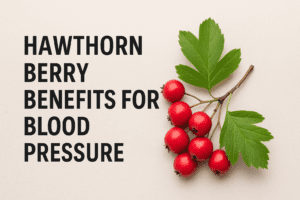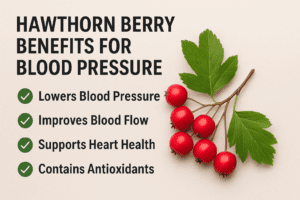If you’re concerned about high blood pressure or just want to strengthen your heart naturally, you may be surprised to learn that one of the most powerful remedies doesn’t come in a prescription bottle. It comes from nature — in the form of a small red fruit called hawthorn berry.
Used for centuries in traditional medicine, hawthorn is gaining recognition today as a scientifically supported aid for cardiovascular health, especially in managing blood pressure. But this isn’t just another herb of the month. Hawthorn works on multiple levels to support your heart — physically, emotionally, and energetically.
In this comprehensive guide, you’ll discover what hawthorn berry is, how it helps regulate blood pressure, and why it could become a daily part of your journey toward better heart health.
What Is Hawthorn Berry?
Hawthorn, or Crataegus, is a thorny shrub native to Europe, North America, and Asia. It belongs to the rose family and grows clusters of bright red berries, often harvested in the fall. In herbal medicine, not just the berries but also the leaves and flowers are used for medicinal purposes.
Since ancient times, hawthorn has been known as a “heart herb.” Roman and Greek physicians praised it for strengthening the heart, and Chinese medicine practitioners have long used it to improve circulation and digestion.
Modern herbalists still rely on hawthorn today — and now, researchers are beginning to understand why.
How Hawthorn Berry Supports Blood Pressure
You might be wondering, how exactly can a berry lower blood pressure? The answer lies in its rich supply of natural compounds that directly affect blood vessels, circulation, and inflammation.
>>>Foods Supplements Hawthorn Berry
1. It Relaxes and Widens Blood Vessels
Hawthorn is packed with flavonoids, including quercetin and oligomeric proanthocyanidins (OPCs). These compounds help your blood vessels dilate, meaning they widen to allow blood to flow more freely.
This effect, called vasodilation, lowers the resistance your heart faces when pumping blood. As a result, your blood pressure naturally decreases — without the crash that often comes with synthetic medications.
2. It Reduces Inflammation and Oxidative Stress
High blood pressure damages arteries over time, causing them to stiffen and narrow. Hawthorn’s antioxidants work to reduce inflammation and oxidative damage in the blood vessels, which helps them stay elastic and functional.
By protecting the delicate lining of your arteries, hawthorn may prevent long-term complications like atherosclerosis, stroke, and heart attack.
3. It Acts as a Gentle Diuretic
One lesser-known benefit of hawthorn is its mild diuretic effect. It helps your body eliminate excess sodium and fluid through urination, which reduces the volume of blood the heart needs to pump.
This reduction in fluid leads to a decrease in overall pressure within your blood vessels — a natural mechanism for controlling hypertension.
4. It Boosts Nitric Oxide Levels
Nitric oxide is a molecule your body produces to help relax blood vessels and improve circulation. Some studies suggest hawthorn enhances nitric oxide production, allowing your vascular system to respond better to physical and emotional stress.
This means not only do your arteries relax, but your heart rate may stabilize as well — contributing to more balanced blood pressure throughout the day.
What Does Science Say About Hawthorn and Blood Pressure?
While hawthorn has centuries of traditional use, modern science is validating its benefits with growing enthusiasm.
-
A 2002 study published in Phytotherapy Research found that patients with mild hypertension who took 500 mg of hawthorn extract daily for ten weeks experienced a significant drop in diastolic blood pressure.
-
In 2006, a study involving type 2 diabetic patients showed that hawthorn extract led to a measurable reduction in systolic blood pressure compared to those who did not take it.
-
A meta-analysis in 2015 reviewed multiple trials and concluded that hawthorn extract not only lowers blood pressure but also improves blood flow and overall cardiovascular health, particularly in people with early-stage heart issues.
These findings support what herbalists have known for generations — that hawthorn is a reliable and gentle remedy for managing high blood pressure.
Emotional and Mental Benefits
Blood pressure doesn’t exist in a vacuum. It often rises in response to stress, anxiety, and emotional strain. Here’s where hawthorn offers something unique.
Many people report that hawthorn has a calming effect on the nervous system. It appears to support the parasympathetic (rest-and-digest) state, helping you feel more grounded, less tense, and better able to handle stress.
If your high blood pressure is linked to anxiety or tension, this subtle emotional balancing effect can be incredibly helpful. You may notice improved sleep, reduced palpitations, and a greater sense of emotional well-being — all of which contribute to lowering your blood pressure naturally.
Other Cardiovascular Benefits
Hawthorn doesn’t stop at blood pressure. Its effects reach other parts of your cardiovascular system:
Strengthens the Heart Muscle
Hawthorn enhances the contractility of your heart. In simple terms, it helps your heart pump more efficiently, with less effort. This is especially helpful for people in early stages of heart failure or those with a weakened heart muscle.
Improves Circulation
Better blood flow doesn’t just benefit your heart. It also improves energy levels, reduces cold extremities, and even enhances brain function by increasing oxygen delivery to tissues.
Reduces Cholesterol and Triglycerides
Some studies suggest hawthorn extract may help lower LDL (bad cholesterol) and triglyceride levels while increasing HDL (good cholesterol). These lipid-balancing effects contribute to a healthier cardiovascular system and lower risk of stroke.
Relieves Angina and Chest Discomfort
Because it improves oxygen delivery and reduces the heart’s workload, hawthorn has been used to help people with angina — the chest discomfort caused by poor blood flow to the heart.
How to Use Hawthorn Berry for Blood Pressure
There are several ways to incorporate hawthorn into your daily health routine:
1. Hawthorn Berry Tea
Steeping dried berries in hot water creates a mildly sweet, herbal tea.
-
How to make: Use 1–2 teaspoons of dried hawthorn berries per cup of water. Simmer gently for 10–15 minutes.
-
Recommended dosage: 1–3 cups per day.
Drinking hawthorn tea daily can be both calming and therapeutic.
2. Capsules and Tablets
Standardized extracts provide consistent dosages and are easy to take.
-
Dosage: Typically 250–500 mg taken two to three times a day.
-
Look for products standardized to 2% flavonoids or 18% OPCs for effectiveness.
3. Liquid Tincture
Tinctures are concentrated and quickly absorbed by the body.
-
Dosage: 20–30 drops in water, 2–3 times daily.
-
Tinctures are ideal for those who prefer not to swallow pills.
4. Combination Formulas
You may also find hawthorn combined with other cardiovascular herbs like garlic, motherwort, or magnesium. These combinations can offer synergistic effects for blood pressure support.
Who Should Be Cautious with Hawthorn?
Though generally safe, hawthorn isn’t for everyone. Here are some precautions to consider:
-
If you’re pregnant or breastfeeding, consult your healthcare provider before use.
-
If you’re already on heart or blood pressure medication, talk to your doctor. Hawthorn can amplify the effects of certain drugs, potentially leading to low blood pressure or drug interactions.
-
Avoid combining with beta-blockers, digoxin, or nitrates without medical supervision.
-
Monitor for symptoms like dizziness or fatigue, especially when starting a new hawthorn regimen.
Always start with a lower dose and gradually increase as your body adjusts.
Real-Life Inspiration: A Case Example
Consider the story of Mark, a 62-year-old man who had struggled with borderline high blood pressure for years. Though his doctor prescribed medication, he was interested in a more natural approach.
With his doctor’s guidance, Mark started taking hawthorn extract capsules twice daily and drinking hawthorn tea every evening. Over the next two months, his blood pressure gradually normalized — and he felt calmer, more energetic, and even noticed improved sleep.
Today, hawthorn is a regular part of Mark’s daily health plan. It’s not a miracle cure, but it gave him a sense of control, connection to nature, and peace of mind.
Best Practices for Getting Results with Hawthorn
To make the most of hawthorn berry:
-
Be consistent. Herbs take time to show their full effect. Allow at least 4–6 weeks.
-
Monitor your blood pressure regularly. Use a home monitor to track how your body responds.
-
Support with lifestyle changes. Exercise, diet, and stress management enhance hawthorn’s effectiveness.
-
Choose quality. Use organic, standardized supplements free from fillers and additives.
Final Thoughts
High blood pressure is a silent burden for many — one that often carries fear, stress, and medication dependency. But nature offers support. Hawthorn berry, with its long history of use and growing scientific backing, is one of the most reliable and gentle herbal allies for cardiovascular health.
It won’t replace emergency care or critical prescriptions. But as part of a balanced, thoughtful wellness routine, hawthorn can bring your body — and your heart — back into rhythm.
It’s not just about lowering a number. It’s about restoring your peace, protecting your future, and reconnecting with the healing power of nature.
Learn more >>> WebMD – Hawthorn Uses, Side Effects, and Benefits
Frequently Asked Questions
Q: How long does it take for hawthorn to lower blood pressure?
A: You may notice changes within 4–6 weeks of consistent daily use. Herbal remedies work gradually.
Q: Can I use hawthorn if I’m already on blood pressure medication?
A: Yes, but always consult your healthcare provider first. Hawthorn can enhance the effects of some medications.
Q: Is hawthorn safe for long-term use?
A: Most people can take hawthorn safely for extended periods, especially under medical supervision.
Q: What’s the best form of hawthorn for blood pressure?
A: Standardized capsules or tinctures offer the most reliable dosage, but teas are also effective and calming.

